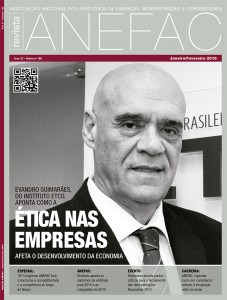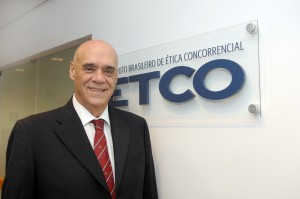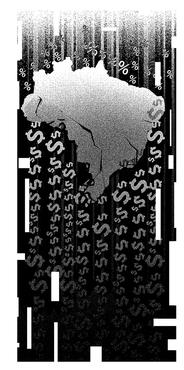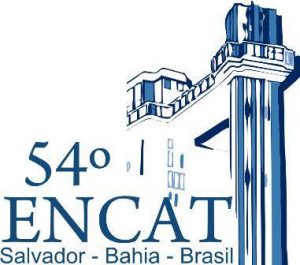Brazil loses R $ 100 billion annually to the crime of smuggling, in the form of tax evasion, loss of jobs in industry and commerce and damage to the health of the population. Several sectors of the economy are severely affected by this crime, such as cigarettes, medicines, clothes, drinks, among others.
This Tuesday, the Movement for the Defense of the Brazilian Legal Market brought together a group of experts and authorities in Brasília to discuss the impacts of smuggling in Brazil and seek solutions to this serious problem.
For Evandro Guimarães, president of the Brazilian Institute of Ethics in Competition (ETCO) and one of the coordinators of the Movement, we are experiencing a delicate moment. "The government desperately needs to expand the collection, but for this purpose it is considering adopting measures that will have an opposite effect to that desired". For Guimarães, it is not possible to charge more sectors that today suffer from the loss of the market to illegality. “How to defend new increases knowing that this will generate unemployment, affect tax revenues, increase crime and destabilize companies based in Brazil? ”, Asks the executive.
See below the main highlights of the event:
The Minister of Justice, José Eduardo Cardozo, presented a brief overview of the activities carried out to combat crime in border regions, with emphasis on actions such as the Sentinela and Ágata operations. The minister also highlighted the importance of greater integration with the police forces of neighboring countries, as a way to curb illegality. Asked about the possibility of the government carrying out longer operations at the borders, the minister was skeptical: “it is clear that the ideal would be to have enough effective to block the borders completely, but this is not viable, especially from the point of view of the effective and operating costs, ”said Cardozo.
This is not what federal deputy Efraim Filho (DEM / PB) thinks, president of the Mixed Parliamentary Front to Combat Smuggling and Counterfeiting. For him, it is not only possible to close the borders to crime, but this would be another way for the government to increase the collection, without, however, resorting to further tax increases: “the minister said that the cost of an action like that would be too high. But a recent study by the Institute for Economic and Social Development of Borders (Idesf), showed that the Agate operation, if carried out permanently, would have the potential to add R $ 3 billion annually to the collection of only two taxes, the IPI and the Tax of operation.
Speaking on the industry panel, Andrea Martini, president of Souza Cruz, showed how the increase in taxes in the tobacco sector over the past 3 years has definitely contributed to the expansion of cigarette smuggling in Brazil. “In 2011, smuggling hovered around% of the market, and had remained almost stable. But with the introduction of the current tax model, which increased the sector's taxes by 110% over a 3-year period, smuggling took a leap and reached 34% of the entire national market this year, ”said Martini. For the executive, in addition to the measures to combat smuggling that must be adopted, there is no more room for tax increases, as this would have devastating effects for Brazilian industry.





Letter of intent
At the end of the event, ETCO president Evandro Guimarães delivered a letter to the minister of justice with suggestions to the federal government that could be adopted in the short and medium term, and which would have a positive effect in combating smuggling..
INTEGRATED LETTER
Your Excellency Sir
José Eduardo Cardozo
Minister of State for Justice
In mid-2014, the Brazilian Institute for Ethical Competition (ETCO) created, alongside the National Forum to Combat Piracy and Illegality (FNCP), the Institute for Economic and Social Development of Borders (Idesf) and the Brazilian Combat Association to Falsification (ABCF), the Movement for the Defense of the Brazilian Legal Market, a coalition that already has more than 70 entities representing sectors of the economy affected by different types of legal deviations such as smuggling, counterfeiting, embezzlement and piracy.
Since then, the Movement has been conducting a series of events, lectures and meetings with the objective of sensitizing Brazilian society and the Federal Government, on these problems. In 2015, for example, we held the 1st National Day to Combat Smuggling, a crime that today brings losses of more than R $ 100 billion to Brazil in the form of tax evasion, losses for the industry and even issues related to health and security of Brazilians.
During this period, it was clear to members of the Movement that some fundamental measures, of varying complexity, would have highly positive effects in combating illegality in the country. At a time when the federal government is seeking a necessary adjustment of its accounts, these measures could, to a large extent, contribute to the country being able to leave the current moment of crisis, without, however, burdening the Brazilian population and the sector even more. productive, which today live with one of the highest tax burdens in the world.
In this way, ETCO, on behalf of the Movement for the Defense of the Brazilian Legal Market, hereby requests the collaboration of the Honorable Minister of Justice for the measures below to become part of the government's positive agenda:
1) Greater investment in the security of our borders - A recent study developed by Idesf shows that the execution of Agate operations has a direct effect on tax collection. By analyzing the periods in which this operation was carried out between the years 2011 and 2014, and cross-checking data on the collection of only two taxes (IPI and Import tax), it was possible to verify that Ágata has a highly positive impact on the coffers. If these operations were carried out on a permanent basis, the additional collection of these two taxes would be greater than R $ 3 billion per year.
2) Maintenance of the current tax burden - In times of crisis, it is tempting to take drastic measures to try to resolve the issue in the shortest possible time. But these measures can often prove to be inefficient. This is the case with the indiscriminate increase in taxes, which at first may seem like a real panacea for Brazil's problems. However, especially in the case of sectors severely affected by illegality, it has an opposite effect to that desired: higher taxes increase the competitive advantage of illegal products in Brazil, and weaken companies that operate legally in Brazil.
3) Brazil / Paraguay Agenda - With a GDP of around US $ 30 billion, and 'exporting' around R $ 20 billion in illegal products annually to Brazil alone, it is clear that activities such as smuggling are part of the economic reality of the neighboring country. It is necessary that Brazil, in the position of the largest economy in South America, act together with the Paraguayan authorities so that the country can develop in a sustainable way, without needing the current heterodox practices.
We can no longer remain indifferent to this situation. The illegal activities mentioned here are destroying the investment and innovation capacity of the Brazilian industry, subtracting billions of reais from public coffers and threatening the employment, health and safety of millions of Brazilians. The real commitment of all, government and civil society, is needed so that Brazil can, once and for all, face with due firmness the problems that affect us all.
Best Regards,
Evandro Guimaraes
Chief Executive Officer of ETCO
To learn more about combating smuggling, click here.
 An unprecedented survey commissioned by the Brazilian Institute of Ethics in Competition (ETCO) for Datafolha brings surprising data. The survey of more than two thousand people in 130 cities across Brazil shows that the majority of respondents (75%) believe that the entry of smuggled products into the country favors the growth of violence and crime. And even more alarming: even in the face of this information, most respondents recognize that they will continue to buy illegal goods. It is the question of price.
An unprecedented survey commissioned by the Brazilian Institute of Ethics in Competition (ETCO) for Datafolha brings surprising data. The survey of more than two thousand people in 130 cities across Brazil shows that the majority of respondents (75%) believe that the entry of smuggled products into the country favors the growth of violence and crime. And even more alarming: even in the face of this information, most respondents recognize that they will continue to buy illegal goods. It is the question of price.











